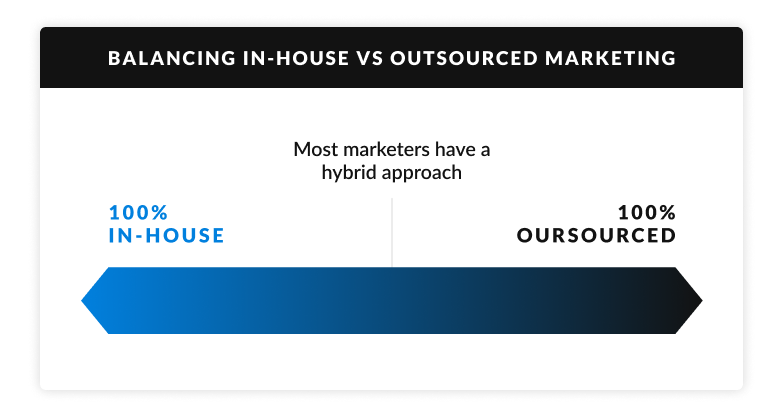
Top marketing performance happens when the right strategy is executed by the right people, working together toward a shared goal. But sometimes it’s hard to assess your marketing team’s strengths and shortcomings. It becomes easier when you know what to look for. But what are the traits of a healthy marketing team? How do you know what strong team health looks like?
Here are 10 characteristics of a healthy marketing team:
- They have good team chemistry
- They understand why buyers buy
- They align goals and business objectives
- They’re proficient with marketing technology
- They understand business finance and metrics
- They can manage projects across multiple resources
- They use the right agencies, consultants, or freelancers
- There is a blend of creative, analytical, and promotional skills
- They flex to adjust tactics while staying true to overall strategy
- They communicate well with other departments and stakeholders
It’s rare that marketing teams exhibit all of these traits at once. Don’t be discouraged if your team is weak in one or more of these areas. Healthy teams likely went through many cycles of learning and growth to get to where they are today. Your team can still evolve.
Let’s take a closer look at each of these characteristics below.
10 Characteristics of a Healthy Marketing Team
1. They have good team chemistry
First and foremost, the people on a healthy marketing team need to have good chemistry. After all, people are the biggest driver of performance. And when it comes to marketing, there are a lot of moving parts across different teams. The way these teams interact with each-other is paramount. Good team chemistry boils down to five pillars:
- Trust. Marketing is an orchestration across many disciplines. Teammates must have confidence that each member will do what they say they’ll do.
- Conflict resolution. When problems arise, healthy marketing teams resolve issues with empathy and kindness.
- Commitment. Team members stay engaged throughout initiatives, and don’t let other priorities get in the way.
- Accountability. Each team member owns specific deadlines or metrics.
- Results-oriented. Team members understand how marketing metrics roll up to the overall business strategy.
2. They understand why buyers buy
A healthy marketing team understands why buyers buy. They know the channels to reach ideal customers and what triggers them to start a buying journey. Strategies built on this foundation of customer insights consistently outperform the rest. Listen to Katelyn Bourgoin explain the concept of “jobs to be done” on our Digital Marketing Troop podcast:
This level of understanding leads to better content and creative strategies. Marketers can get to these insights by talking directly with customers, or even “mining” customer reviews on Google, Yelp, G2, or Angie’s List. This qualitative data can be organized by sentiment to detect patterns and trends to influence parts of your marketing strategy, like messaging, imagery, channels, and pricing.
3. They align goals and business objectives
Marketing campaigns take time. A healthy marketing team sets the right expectations based on goals and objectives, and the resources available to deliver. Marketing impact sometimes isn’t felt for months, even years later. This level of planning requires the ability to zoom in and out between strategies and tactics.
When marketing fails to produce the intended impact, it could be due to misalignment between business goals and digital marketing objectives. A healthy marketing team periodically takes a step back to examine whether their existing strategy aligns with the direction of the business. This level of thinking keeps resources devoted to activities that will have the right kind of business impact.
4. They’re proficient with marketing technology
Let’s face it. You cannot expect to drive results without some proficiency operating marketing technology platforms. This ranges from ad platforms like Google and Facebook, to email platforms like HubSpot and Salesforce/Pardot, and everything in-between. In fact, the sheer volume of marketing technology solutions is overwhelming. Each year, Scott Brinker produces a map of the marketing technology landscape. In the 2022 report, he documented 9,932 different marketing technology solutions (see the image below).

A healthy marketing team knows how to operate the platforms and channels they need to generate leads and sales. Unfortunately, these are hard skills to learn and become proficient. Larger marketing teams may need to invest in periodic training, learning and development programs. Smaller teams may consider working with freelancers or agencies.
5. They understand business finance and metrics
Marketing is a long-term investment in brand growth and revenue generation. It can sometimes be viewed as a cost-center by business owners and CEOs. Healthy marketing teams have a strong relationship with the CFO and understand how to use business financial metrics to communicate with other key stakeholders. This can be a pain point for some CMOs, but overcoming it can unlock collaboration with a strong ally.
Here are some key metrics marketing teams can use to speak the language of the CFO:
- Customer lifetime value (CLTV) — the gross profit a customer delivers to a business throughout the entire time they spend as a customer. This can help measure the kinds of customers you want to go after in the future, and on which channels to find them.
- Return on ad spend (ROAS) — how much revenue is generated per dollar invested in advertisements. This can be helpful to measure the overall performance of your advertising campaigns, and used to forecast revenue.
- Cost-per-acquisition (CPA) — the investment needed, on average, to win one new customer. Over time, this can help measure channel performance and how that contributes to margin and profitability.
- Cost-per-click (CPC) — the investment needed, on average, to generate one click. This can be helpful to test and measure the performance between two different pay-per-click (PPC) campaigns.
- Cost-per-mille (CPM) — the investment needed to reach 1,000 prospective customers with your message. This can be helpful to measure awareness campaigns.
6. They can manage projects across multiple resources
Marketing is a function that connects to nearly every part of a business. Coordinating with so many disparate resources requires adept project management skills. Healthy marketing teams realize this and use tools and techniques to keep projects moving along. Pleasant persistence and project management tools like monday.com and Asana can help marketers stay on track.
7. They use the right agencies, consultants, or freelancers
The right marketing team structure brings core skills in-house and outsources others. Healthy marketing teams know what skills they need, and find the right partnerships with agencies, consultants and freelancers. This keeps operating costs low, and gives the business flexibility to adjust marketing investments as-needed.
Of course, there are pros and cons to using agencies. Marketing teams must consider what makes the most sense for their business and strategy.

8. There is a blend of creative, analytical, and promotional skills
A healthy marketing team is made up of a wide range of skills, but there are four essential skill groups needed to execute on just about any marketing strategy:
- Creative — graphic design, copywriting, storytelling
- Analytical — data management, reporting, SEO
- Promotional — social media, community, positioning
- Interpersonal — empathy, teamwork, communication
9. They flex to adjust tactics while staying true to overall strategy
Change is a constant in marketing. The best teams know when and how to adjust tactics like copy, frequency, and channels. They do all this while maintaining the direction of their original strategy—a characteristic of a strong marketing team.
10. Effective communication with other departments and stakeholders
Healthy marketing teams coordinate with many different departments and stakeholders like sales, customer success, engineering, subject-matter experts, and the c-suite. Naturally, healthy marketing teams communicate effectively. As companies transition into a mix of remote, asynchronous, and in-person work environments, this will become even more important. Listen to Erika Khanna, People and Culture expert, speak about how companies can build a healthy remote-first culture:
Work with a new kind of agency
Top performance is a result of healthy marketing team chemistry. When you work with Silverback, you are matched with teams built using behavioral science. This helps teams solve business challenges and collaborate more effectively. Contact us today.
This focus on team chemistry is reflected in our culture. In fact, AdAge, Inc Magazine and the Washington Post have recognized Silverback as one of the top places to work in the United States.
Recent Posts
Creative Strategy in Digital Advertising
Read the ArticleEthical Considerations of AI In Marketing: Balancing Innovation with Responsibility
Read the ArticleTop-Down vs. Bottom-Up Budgeting: Which Should You Use?
Read the Article
Unlock Your Growth Potential
Silverback helps businesses catapult web traffic, leads, and sales. We combine analytical and creative expertise to drive inbound marketing campaigns and track it all to find insights on what worked, what didn’t, and what we should try out next.
Contact Us